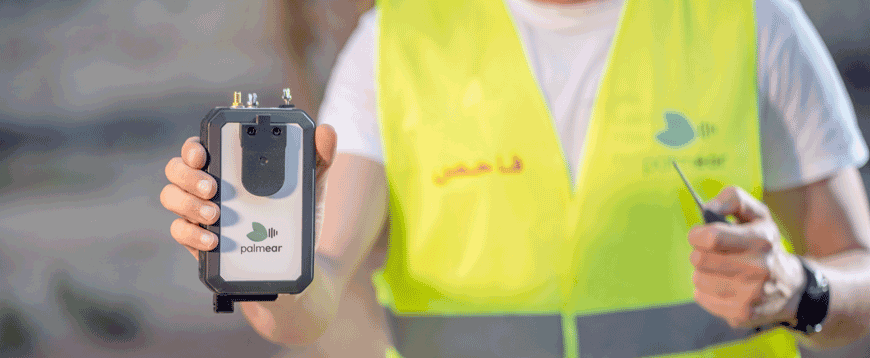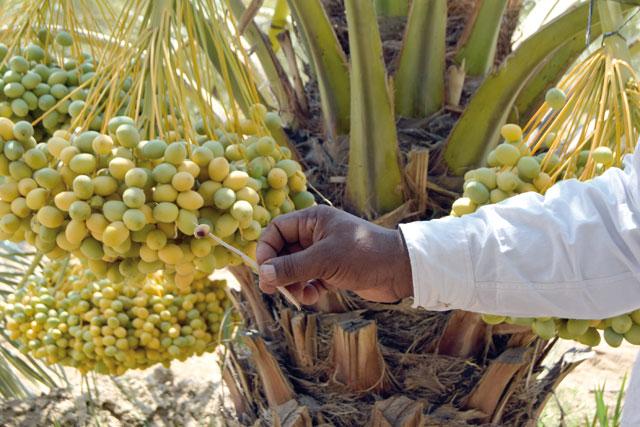You are here
Startup harnesses AI tech to combat palm weevil infestation
By Mays Ibrahim Mustafa - May 21,2023 - Last updated at May 21,2023

Palmear, Zeid Sinokrot’s startup, currently deploys a portable sensor to detect palm weevil infection (Photo courtesy of Zeid Sinokrot)
AMMAN — When Zeid Sinokrot started a project to cultivate date palms with his family in Jericho, a Palestinian city in the West Bank, they were faced by an impossible challenge after the dreaded palm weevil swarmed the farm.
The venture Sinokrot, who’s an industrial engineer, undertook, allowed him to learn first-hand about a serious issue that is threatening the sustainability of palm cultivation worldwide.
The red palm weevil is widely considered to be one of the most invasive agricultural pests in the palm sector, which is a fundamental contributor to the national economy of many countries in the region and worldwide, including Jordan.
According to the Food and Agriculture Organisation of the United Nations (FAO), this insect pest, which originated in South Asia, “has already infested or destroyed palms worth 483 million euros in Mediterranean countries alone”.
In the Near East and North Africa (NENA) region, this weevil is damaging the production of date palms, harming the environment and posing a threat to the livelihoods of roughly 50 million farmers, it stated.
Sinokrot noted that because the infestation begins inside the tree, one has to wait for symptoms to appear on its outer bark to detect it, and by then “it’s too late to do anything”. That’s why farmers’ overuse pesticides on all trees as a precautionary measure.
The palm weevil attacks all types of palm trees, including coconut palms, date palms as well as oil palms and it spends 80 per cent of its life cycle hidden inside the tree’s trunk, according to Sinokrot.
He explained that after fertilisation, a single adult female can lay roughly 300 eggs in cracks and crevices it produced inside the tree while searching for food. When the eggs hatch, the larvae begin feeding on the inner tissue of the tree, tunnelling through its trunk and causing significant damage.
Upon visiting farms in the Jordan Valley and around the world, Sinokrot found that farmers there were relying on experts who used stethoscopes to listen to the sounds inside trees in order to try and determine whether or not they’re infected.
“Although this method can be unreliable and time consuming, learning about it allowed me to reach two conclusions; the weevil makes a sound that induces vibrations and using stethoscopes to detect it requires an experienced ear that is able to recognise and distinguish the different sounds inside the tree and in its surrounding environment. It was the beginning of my journey towards a solution,” he told The Jordan Times.
With a team of specialists in electronics, artificial intelligence, acoustics and agriculture from around the world, Sinokrot lived on a farm in the Jordan Valley for three years conducting research.
“We artificially infected our own date palms with the palm weevil and began monitoring its life cycle, learning about how it lives, feeds and breeds,” he said.
In order to create an algorithm that is capable of detecting it, the team recorded the noises made by its larvae as they feasted, in addition to any other sounds that might be heard on a farm, such as moving cars, water hoses, cows, tractors and other insects, over a period of six months.
Palmear, Sinokrot’s startup, currently deploys a portable sensor, which conducts a 50-second acoustic scan by listening to the tree after inserting a needle that is 3mm-thick into its trunk. The device then sends the data resulting from the scan to the software app, which makes an informed decision on whether or not the tree is infected.
The software, which currently achieves a 90-per-cent detection accuracy, continuously improves itself because it’s AI-based, according to Sinokrot.
Hatem Dabash has been a date palm farmer in the Jordan Valley since 2008. His farm was once infected with the red palm weevil and he was only able to detect it after eight productive trees had already died, costing him thousands of dinars.
He told The Jordan Times that Palmear’s device recently helped him discover that 67 trees at his farm are infected with this insect pest.
“There were no visible signs of an infestation,” Dabash said, noting that this early detection method allowed him to save the farm and reduce his use of pesticides on the long run by roughly 40 per cent.
Date palms constitute 20 per cent of cultivated areas in Jordan with around 650,000 palm trees, covering an area of roughly 48,000 dunums, according to the Ministry of Agriculture.
Director of the Plant Protection and Phytosanitation Directorate at the Ministry of Agriculture Imad Al Awad said that the main two varieties of palm trees cultivated in Jordan are Barhi and Medjool.
Their produce is exported to European Union countries, the UAE, Qatar, Kuwait, Morocco, Turkey, the UK, France and many others, he added, noting that annual sales in the Jordanian date sector amount to around $140 million.
“Protecting this sector and countering the red palm weevil, which poses a serious threat to its sustainability, is one of the ministry’s top priorities,” Awad told The Jordan Times.
Plamear signed an agreement with the ministry last October, providing it with five devices free-of-charge and training its staff on how to use them, according to Awad.
He noted that deploying this technology helps with early detection.
“A date palm only begins to bear fruit after six years and can cost between JD500 to JD1,000, depending on its age and variety. If a palm weevil infection isn’t contained and dealt with, it can probably eradicate an entire farm, causing tremendous losses,” Awad added.
Sinokrot explained that the ministry also has access to a map on which all detected infestations are tagged, allowing it to know where there are hotspots of palm weevil infections in Jordan and act accordingly.
Palmear is currently conducting trials in different countries around the world, which are interested in deploying its technology on their palm farms.
Related Articles
AMMAN — The Ministry of Agriculture launched on Tuesday a two-week campaign to eliminate the red palm weevil, a devastating pest of palm tre
AMMAN — Authorities uprooted 420 palm trees in Azraq District, east of the country, during this month after discovering the red palm weevil,
AMMAN — The Food and Agriculture Organisation of the United Nations (FAO) in Jordan on Wednesday launched the first of a series of training

















